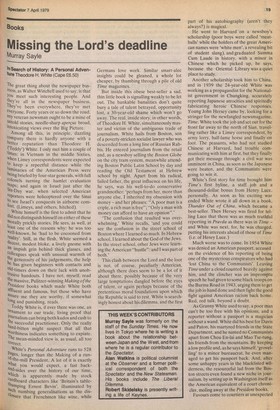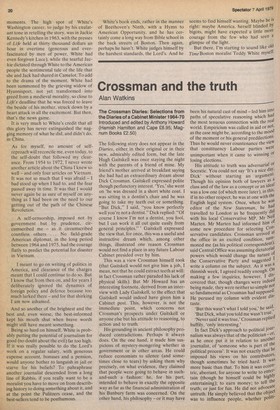Missing the Lord's deadline
Murray Sayle
In Search of History: A Personal Adventure Theodore H. White (Cape E6.50) The great thing about the newspaper business, as Walter Winchell used to say, is that You meet such interesting people. And they're all in the newspaper business. They've been everywhere, they've met everyone. Forty years or so down the road. any veteran newsman ought to be a mine of Untold stories, needle-sharp apercus broad, intoxicating views over the Big Picture.
Among all this, in principle, dazzling company there is hardly anyone with a better reputation than Theodore H. (Teddy') White. I only met him a couple of times: in Vietnam in the middle Sixties, When Limey correspondents were expected to keep a repectful distance while the luminaries of the American Press were being briefed by four-star generals, with full colonels turning the hamlet evaluation Maps; and again in Israel just after the Six-Day war, when selected American reporters were helicoptered over the Sinai to see Israel's conquests in airborne comfort. (Limeys, and others, hitched). White himself is the first to admit that he did not distinguish himself on either of these Morally prickly stories. He sees, as well, at least one of the reasons why: he was too Weil-known, he 'had to be cocooned from reality'. Still, in the flesh, White seemed a decent, modest bloke, a lively gnome with an impish grin behind thick glasses, and colleagues speak with unusual warmth of ,he generosity of his judgements, the help "e has given beginners with contacts and old-timers down on their luck with unobtrusive handouts. I have not, myself, read the massive, Pulitzer-winning Making of the President books which made White both affluent and famous, but those who have assure me they are worthy, if somewhat 'Ong and punishing, reads. Teddy White is, if ever there was one, an ornament to our .trade, living proof that urnalism can bring both kudos and cash to t,oe successful practitioner. Only the really nard-bitten might suspect that all that Worthiness indicates something to expiate. The mean-minded view is, as usual, all too correct.
White's Personal Adventure runs to 528 Pages, longer than the Making of a runof-the-mill President. A lot of it is exactly A'hat you would expect, a fast backand-sides over the history of our time, Which is apparently made by stock cardboard characters like 'Britain's tablethumping Ernest Bevin', illuminated by Such numbing generalisations as the disclosure that Frenchmen like wine, while Germans love work. Similar smart-alec insights could be gleaned, a whole lot cheaper, by thumbing through a pile of old Time magazines.
But inside this obese best-seller a sad, thin little book is signalling weakly to be let out. The bankable banalities don't quite bury a tale of talent betrayed, opportunity lost, a 30-year-old shame which won't go away. The real, inside story, in other words, of Theodore H. White, simultaneously master and victim of the ambiguous trade of journalism. White hails from Boston, son of a poverty-stricken socialist lawyer who was descended from a long line of Russian Rabbis. He entered journalism from the retail end, as a newsboy selling the Boston Globe on the city tram system, meanwhile attending Boston Public Latin School by day and reading the Old Testament at Hebrew school by night. Apart from his radical, failed father, the great influence on his life, he says, was his well-to-do conservative grandmother: 'perhaps from her, more than anyone else, I inherited my obsession with money — and her phrases: "A poor man is a criple, a rich man is free"; "Only a man with money can afford to have an opinion": 'The confusion that resulted was overwhelming,' White recalls, 'and you could see the confusion in the street school of Boston where I learned so much. In Hebrew school, I learned about the God of the Jews. In the street school, other Jews were learning the American "hustle": and I was part of both.' • This clash between the Lord and the loot is not, of course, peculiarly American. although there does seem to be a lot of it about there, possibly because of the very large temptations dangled before the eyes of talent, or again perhaps because of the pretentious moral foundations upon which the Republic is said to rest. White is searchingly honest about his dilemma, and the first part of his autobiography (aren't they always?) is magical.
He went to Harvard on a newsboy's scholarship (poor boys were called 'meatballs' while the holders of the great American names were 'white men', a revealing bit of student slang), and graduated Summa Cum Laude in history, with a minor in Chinese which he picked up, he says, because the Oriental Library was a quiet place to study.
Another scholarship took him to China, and in 1939 the 24-year-old White was working as a propagandist for the Nationalist government in Chungking, accurately reporting Japanese atrocities and spiritedly fabricating heroic Chinese responses. Young John Hersey came by, looking for a stringer for the newfangled newsmagazine, Time. White took the job and set out for the front far away to the north of Sian, travelling rather like a Limey correspondent, by army lorry, half-lame horse and finally on foot. The peasants, who had not studied Chinese at Harvard, had trouble communicating with him at first, but they finally got their message through: a civil war was imminent in China, as soon as the Japanese were beaten, and the Communists were going to win it.
White's first story for time brought him Time's first byline, a staff job and a thousand-dollar bonus from Henry Luce, personally. As soon as his exciting war ended White wrote it all down in a book, Thunder Out of China, which became a best-seller. Then Hersey was fired for telling Luce that there was as much truthful reporting in Pravda as there was in Time — and White was next, for, he was charged, putting his interests ahead of those of Time (i.e. of Henry Luce.) Much worse was to come. In 1954 White was denied an American passport. accused on the evidence of his reporting of being one of the mysterious conspirators who had 'lost China to the Communists'. Leaving Time under a cloud counted heavily against him, and the clincher was an impromptu speech he had given to some black troops on the Burma Road in 1943, urging them to get the job in hand done and then fight the good fight against American racism back home. Red, red talk, beyond a doubt.
As Granny White used to say, a poor man can't be too free with his opinions, and a reporter without a passport is a magician without a wand. White did his best for Davis and Paton, his martyred friends in the State Department, and he named no Communists apart from Chou En-lai and Mao Tse-tung, his friends from the mountains. By keeping a low profile and, as he says himself, 'grovelling' to a minor bureaucrat, he even managed to get his passport back. And, after some unhappy years in the blacklisted wilderness, the resourceful lad from the Boston streets even found a new niche in journalism, by setting up in Washington itself as the American equivalent of a court chroniCler, mcaing away at the President books. Favours come to courtiers at unexpected moments. The high spot of White's Washington career, to judge by his exulatant tone in retelling the story. was in Jackie Kennedy's kitchen in 1963. with the presses of Life held at thirty thousand dollars an hour in overtime (generous and everfascinated by men of power, White had even forgiven Luce). while the tearful Jackie dictated through White to the American people the sentimental tale of the life that she and Jack had shared in Camelot. To add to the drama of the moment. White had been summoned by the grieving widow of Hyannisport. not yet transformed into greed from a medieval morality, so close to Life's deadline that he was forced to leave the beside of his mother, struck down by a heart attack in all the excitement. But then, that's the news game.
It is very much to White's credit that all this glory has never extinguished the nagging memory of what he did, and didn't do. in China.
As for myself, no amount of selfreproach will reconcile me, even today, to the self-doubt that followed my clearance. From 1954 to 1972. I never wrote another article about the China I knew so well — and only four articles on Vietnam. It was not so much that I was afraid — I had stood up when I had to, and the fear passed away in time. It was that I would never again be as sure of myself on anything as I had been on the need to our getting out of the path of the Chinese Revolution.
A self-censorship, imposed not by government but by prudence, circumscribed me — as it circumscribed countless others . . . No field-grade American diplomat, in the long period between 1964 and 1975, had the courage flatly to predict the potential for disaster in Vietnam.
I meant to go on writing of politics in America, and clearance of the charges meant that I could continue to do so. But I know that from then on. and for years I deliberately ignored the dynamics of foreign policy and defence because too much lurked there — and for that shirking I am now ashamed.
And so another of the brightest and the best and, even worse, the best-informed kept his mouth shut when brave words might still have meant something.
Being so hard on himself, White is probably putting the potential of journalism for good (no doubt about the evil) far too high. If it was really possible to do the Lord's work on a regular salary, with generous expense account, bonuses and a pension, would anyone bother to languish in jail or starve for his beliefs? To pahraphrase another journalist descended from a long line of Rabbis, if you really want to be a moralist you have to move on from describing history to doing something about it, and at the point the Pulitzers cease, and the best-sellers tend to be posthumous. White's book ends, rather in the manner of Beethoven's Ninth, with a Hymn to American Opportunity. and he has certainly come a long way from Bible school in the back streets of Boston. Then again, perhaps he hasn't. White judges himself by the harshest standards, the Lord's. And he seems to find himself wanting. Maybe he is right: maybe America, herself blinded by bigots, might have expected a little more courage from the few who had seen a glimpse of the light. But there, I'm starting to sound like old Time Boston moralist Teddy White myself.



































 Previous page
Previous page